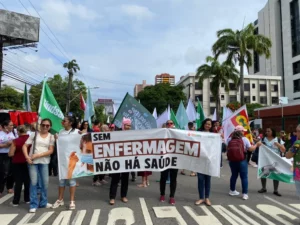The 1st National Virtual Plenary of CTB Workers, held on June 20, 2020, brought together more than 1,500 class oriented unionists and approved the following political resolution:
1- Brazil is going through a very serious and unprecedented crisis, which is sanitary, economic and political;
2- Due to President Jair Bolsonaro´s irresponsibility and inoperability the coronavirus pandemic became a tragedy. Our country currently occupies the second position in the international ranking of deaths from the disease, behind only the USA;
3- On Saturday (20) the number of fatal victims of Covid-19 exceeded 50 thousand and over 1 million cases registered by the state health departments were exceeded;
4- The virus worsened the economic crisis in Brazil and worldwide. OECD and World Bank estimates indicate that by the end of the year we will witness the greatest global economic depression at least since 1929. The world economy, also disturbed by geopolitical conflicts between the USA and China, is expected to end 2020 with a fall of more than 6% and the fall of the Brazilian economy may exceed 9%, according to the OECD;
5- Recent statistics from IBGE (Brazilian Institute of Geography and Statistics) and the Central Bank (Bacen) show that the recession has already entered. The preview of Bacen’s GDP signals a decline of 9.7% in production in April and 4.5% since January. The service sector, which accounts for about 70% of GDP and employment, declined 11.7% in April; industry fell 18.8% and trade 16.8%, according to the IBGE;
6- The working class is the main victim of the sanitary and economic crisis, alongside the micro, small and medium producers in the countryside and cities. Workers, especially those who perform essential services and are unable to isolate themselves, are more exposed to the virus and many have already paid with their lives for this condition, aggravated by the neglect of bosses and governments, as well as a lack of tests and PPE. Employers generally seek to take advantage of the situation to harm rights and increase the degree of exploitation of the workforce;
7- IBGE data show that only 48% of working-age individuals are employed in the country. This means that the real number of unemployed is over 50 million. More than 100 million Brazilians applied for emergency aid. The open unemployment rate, which does not reflect this reality, is expected to exceed 20% by the end of this year. It is estimated that 90% of informal workers have lost their source of income;
8- In unity with the other centrals, CTB fights tirelessly and by all means available to protect and enforce the rights and interests of the working class. The achievement of an emergency income of R$ 600.00 (US$120) owes much to the unitary action of the union centrals, which also managed to reverse the setbacks imposed by Bolsonaro through various MPs and stood out in the guidance, awareness and class solidarity with the people in the pandemic;
9- It is essential to protect employment and wages, extend the term of unemployment insurance, and guarantee the minimum income for informal workers and unemployed workers, emergency sickness assistance for at-risk retirees. It is also essential to ensure security, prevention and protection measures for categories that, when performing essential activities, are excluded from isolation; greater attention is needed to the life, health and safety of family farmers, whose work must be valued, as it is responsible for more than 70% of the food consumed by our society; it is essential to preserve food sovereignty to guarantee supply;
10- Tens of thousands of lives would be saved and the impacts of Covid-19 reduced if the federal government adopted, from the beginning, the necessary measures to face the crisis, starting with the strict social isolation recommended by the World Health Organization (WHO). In the economic sphere, immediate expansion of public investments for the acquisition of tests, PPE, respirators, masks, expansion of the hospital network, strengthening of the SUS (Brazilian public health system) and protection of employment and income was necessary. That was not the case.
11- Bolsonaro defined Covid-19 as a “little flu”, sabotaged social isolation with the support of business leaders, declared war on governors and mayors, militarized the Ministry of Health, left it no-brainer and discredited his data report on victims of coronavirus. At the same time, he insists, alongside Paulo Guedes (Ministry of Economy), on the neoliberal restoration policy inaugurated by the 2016 coup and radicalized in this government, which committed Brazil’s foreign policy to the USA, an intolerable affront to the Constitution. In view of this critical situation, it is necessary to expand support for the indispensable action of assisting patients with Covid-19, a relentless disease whose control requires that the chains of transmission of the coronavirus be broken;
12- The crisis highlighted the irrationality of the neoliberal ideology founded on the fallacy of the minimal state. It was clear that the solution to economic and social problems will not come spontaneously from the markets; it necessarily involves strong State intervention in the economy. The resistance of the government and in particular the Ministry of Economy in this regard is one of the main obstacles to be overcome in the struggle in defense of life, health, employment, income and the national economy itself;
13 – The rich must help to pay the burden of the crisis. Bankers, big businessmen, reinters, speculators and investors cannot once again be exempt from any contribution; it is urgent to institute an extraordinary tax on large assets, suspend the payment of public debt, tax the remittance of profits and dividends abroad and at the same time correct the Individual Income Tax table;
14- It is possible and necessary to do much more, making concrete the proposals defended by the Centrals and presented to countless authorities; there is an urgent need to revoke the Constitutional Amendment 95, which froze public spending, and invest heavily in strengthening our Unified Health System, SUS; there is also an urgent need to put in place protective measures for small and medium-sized enterprises, which still lack access to credit; preserve collective agreements and conventions, combat individualization of labor negotiations and ensure the powers and duties of unions; interrupt the privatization policy and strengthen public companies; solidarity and protection for all states and municipalities, without ideological and political discrimination; universalization of public services, valorization of public servants in opposition to the dismantling proposed with the regressive administrative reform, which imposes a reduction in the workforce, freezes and low wages, eliminates careers and ends public tenders;
15- The argument that the State has no money to carry out such proposals is false. On the pretext of preventing a financial crisis, the” Planalto Palace” placed more than R$ 1 trillion (US$ 200 billions) at the disposal of banks, which last year grabbed record profits of R$ 89 billion (US$ 17,8 billions);
16- There is even the possibility of printing money without higher costs, which in a moment of deflation does not mean the risk of inflation. Monetary expansion is essential to save lives and extend emergency aid until December, as proposed by CTB. The problem is the preferential option of the extreme right government for the rich to the detriment of the people;
17- Due to the fault of the President of the Republic, Brazil is today also disturbed by a political and institutional crisis, which goes hand in hand with the health and economic crises;
18- With his insane behavior, the neo-fascist leader intends to pave the way for a democratic rupture and the establishment of an authoritarian, dictatorial regime, similar to what the military did in 1964; he runs over the Constitution, attacks institutions, journalists, the popular and repeatedly breaks decorum. In these conditions, the struggle in defense of democracy gains centrality and demands the constitution of a broad political and social front against the current government, seeking to include governors, mayors and the broadest and most diverse sectors of society. The configuration of the broad front, indispensable to the defense of democracy, is being shaped by the formation of several converging articulations in defense of democracy from different ideological and party currents;
19- CTB leaders and activists must also prioritize the mobilization of workers for this year’s municipal elections, an important step in the struggle for resistance and the accumulation of forces against the Bolsonaro government;
21- The reaction of the STF ministers to the provocations of the “bolsonarist” extremists raised the temperature of the crisis, while the arrest of Fabrício Queiroz, a former adviser to Flávio Bolsonaro (President’s son), rekindled the media spotlight on the dangerous links between the Clan Bolsonaro and the Rio militias;
22- It is necessary to intensify the ideological and political fight against the government in all media and especially in social media, where the extreme right is powerful but has been losing strength. The tendency is for street protests to resume strongly as the pandemic subsides, although today it is not possible to rule out the risks of a second wave. Brazil urgently needs to rescue sovereignty and a new national development project with democracy and valorization of work;
23- The path in this direction necessarily passes, and even more so in the face of the political and institutional crisis opened by the government, for the realization of the objective of the national campaign launched by the centrals and social movements: GET OUT, BOLSONARO!!!






